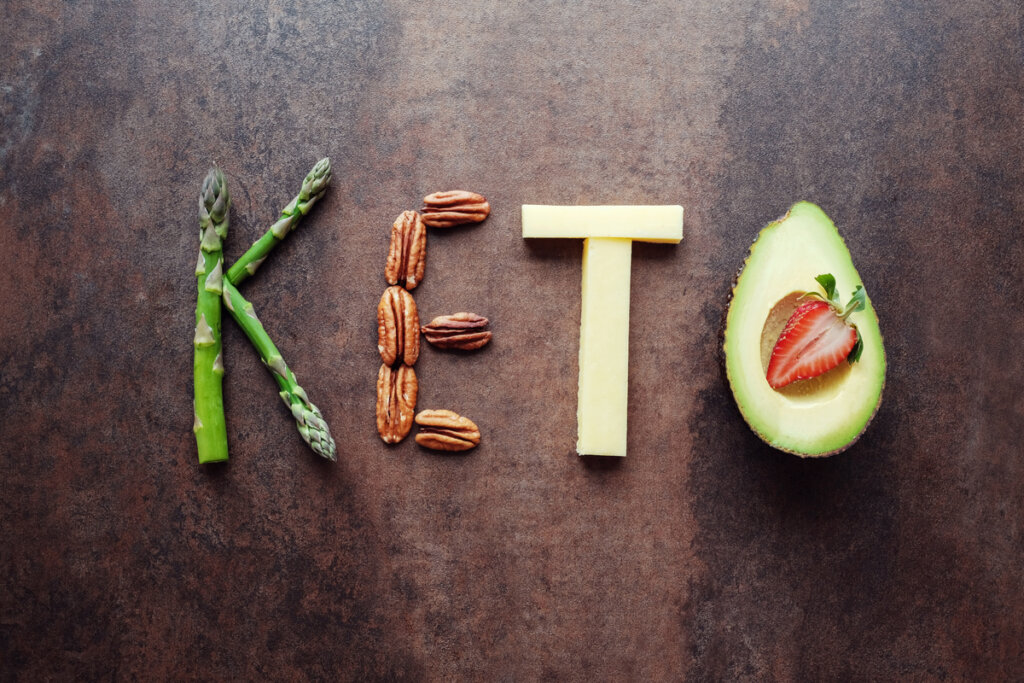Neuroketotherapy: Using Ketosis to Treat Neurological Disorders

Neuroketotherapy is based on the ketogenic or keto diet. This eating plan involves the consumption of a minimum proportion of carbohydrates (five percent), normal consumption of protein (15 percent), and a high consumption of healthy fats (80 percent) (Tillery et al., 2021).
The ketogenic diet seeks to trigger a process called ketosis. The restriction of carbohydrates activates lipolysis, creating ketones to use as the primary energy source instead of glucose. Therefore, this diet causes the body to burn fat instead of carbohydrates for energy.
Although it’s currently used as a conventional method for weight loss, it was originally developed to control seizures in people with epilepsy. In fact, the keto diet appears to have beneficial effects not only for weight loss and epilepsy but also for migraines and Alzheimer’s. Furthermore, it’s linked to significant and substantial improvements in symptoms of depression and psychosis as well as metabolic health.

Neuroketotherapy and mental disorders
Neuroketotherapy consists of the application of the ketogenic diet for the treatment of psychiatric or neurological disorders. This shouldn’t really surprise us or seem strange, as one of the variables with the most impact on how we feel is what we eat.
Neuroketotherapy has positive effects on various mental disorders. The action of the ketogenic diet alters the balance between gamma-aminobutyric acid ( GABA ) and glutamate, benefiting GABA. The increase in this neurotransmitter can help compensate for its deficiency in patients with schizophrenia and relieve hallucinations and delusions.
In addition, it’s considered that the ketogenic diet reduces reactive oxygen species and raises levels of adenosine triphosphate and phosphocreatine. This increases the efficiency of metabolic activity. Furthermore, it helps reduce brain inflammation and provides relief for several neurodegenerative disorders, including Alzheimer’s disease and Parkinson’s disease.
The influence of the ketogenic diet on psychiatric conditions is due, in part, to the fact that ketosis limits apoptosis (programmed cell death) and the excitability of neurons. It explains the success of these diets in people with epilepsy (Maalouf et al., 2009; Ułamek-Kozio et al., 2019). Alterations in metabolic activity related to reductions in seizures in epileptics also have positive effects in patients with autism spectrum disorder (ASD). This is due to favorable changes in the gut microbiome.
Neuroketotherapy has also been used in the treatment of bipolar disorder. Its action on this disorder is due to the fact that acidic plasma stabilizes mood by decreasing intracellular sodium and calcium (Tillery et al., 2021). It’s also been applied in patients suffering from narcolepsy. In fact, it seems the keto diet increases the activation of neurons that secrete orexin which improves our state of daytime activation.
Other benefits of ketogenic diets
Ketogenic diets can facilitate the production of adenosine triphosphate (ATP) in people with mitochondrial dysfunction (Vidali et al., 2015). This energy-providing compound has been associated with depression at low levels.
Neuroketotherapy can help decrease oxidative stress, which is associated with different medical conditions. Therefore, eating a ketogenic diet improves oxidative stress, and helps reverse some of the damage it can cause. This can improve symptoms of depression (Greco et al., 2016).
In addition, the ketogenic diet has a positive influence on insulin levels. That’s because it limits the intake of sugar and starch. In addition, it keeps blood sugar levels stable. The keto diet also improves inflammation, because using ketones as an energy source produces fewer pro-inflammatory compounds.
Neuroketotherapy and nutrition
Next, we’ll review what you can and can’t eat while on a ketogenic diet, according to Mawer (2020). However, we recommend that you don’t change your eating plan without first consulting a nutritionist. Similarly, keep in mind that neuroketotherapy must be carried out by a specialized health professional. Don’t try and start it on your own.
Foods you can’t eat on the keto diet
- Sugary foods. Soft drinks, fruit juices, smoothies, cakes, ice cream, candy, etc.
- Grains or starches. Products based on wheat, rice, pasta, cereals, etc.
- Beans or legumes. Peas, beans, lentils, chickpeas, etc.
- Tubers. Potatoes, sweet potatoes, carrots, parsnips, etc.
- Low-fat or diet products. Low-fat mayonnaise, salad dressings.
- Some condiments or sauces. Barbecue sauce, mustard, honey, teriyaki sauce, ketchup, etc.
- Unhealthy fats. Processed vegetable oils, mayonnaise, etc.
- Alcohol. Beer, wine, liquor, mixed drinks.
- Sugar-free diet foods. Sugar-free candies, syrups, puddings, sweeteners, desserts, etc.
Foods you can eat on the keto diet
- Meat. Red meat, steak, ham, sausage, bacon, chicken, and turkey.
- Fish. Salmon, trout, tuna.
- Eggs. Whole omega-3 or grass-fed eggs.
- Unprocessed cheeses. Cheddar, goat, cream, blue, or mozzarella.
- Nuts and seeds. Almonds, walnuts, flax seeds, pumpkin seeds, chia seeds, etc.
- Healthy oils. Extra virgin olive oil and avocado oil.
- Avocados.
- Low-carb vegetables. Greens, tomatoes, onions, bell peppers, etc.
- Seasonings. Salt, pepper, herbs, spices.

Neurokethotherapy
Finally, the fact that neuroketotherapy is a form of treatment for psychiatric disorders demonstrates that one of the best medicines for the body and mind is food. Indeed, being careful with what you eat and knowing the healing potential of certain diets and foods is one of the most fundamental ways to improve your quality of life.
Editorial note: Although neuroketotherapy can be broken down into neuroketo+therapy, we’re not talking about a form of therapy as such, but about a diet that can come in handy if your interests are those described in the article. However, before you make any of these types of changes in your diet, consult a nutritionist.
All cited sources were thoroughly reviewed by our team to ensure their quality, reliability, currency, and validity. The bibliography of this article was considered reliable and of academic or scientific accuracy.
- Bansal, Y., & Kuhad, A. (2016). Mitochondrial dysfunction in depression. Current neuropharmacology, 14(6), 610-618.
- Brietzke, E., Mansur, R. B., Subramaniapillai, M., Balanzá-Martínez, V., Vinberg, M., González-Pinto, A., … & McIntyre, R. S. (2018). Ketogenic diet as a metabolic therapy for mood disorders: evidence and developments. Neuroscience & Biobehavioral Reviews, 94, 11-16.
- Danan, A., Westman, E. C., Saslow, L. R., & Ede, G. (2022). The Ketogenic Diet for Refractory Mental Illness: A Retrospective Analysis of 31 Inpatients. Frontiers in Psychiatry, 1421.
- Gasior, M., Rogawski, M. A., & Hartman, A. L. (2006). Neuroprotective and disease-modifying effects of the ketogenic diet. Behavioural pharmacology, 17(5-6), 431.
- Greco, T., Glenn, T. C., Hovda, D. A., & Prins, M. L. (2016). Ketogenic diet decreases oxidative stress and improves mitochondrial respiratory complex activity. Journal of Cerebral Blood Flow & Metabolism, 36(9), 1603-1613.
- Lee, R. W., Corley, M. J., Pang, A., Arakaki, G., Abbott, L., Nishimoto, M., … & Wong, M. (2018). A modified ketogenic gluten-free diet with MCT improves behavior in children with autism spectrum disorder. Physiology & behavior, 188, 205-211.
- Maalouf, M., Rho, J. M., & Mattson, M. P. (2009). The neuroprotective properties of calorie restriction, the ketogenic diet, and ketone bodies. Brain research reviews, 59(2), 293-315.
- Masino, S. A., & Ruskin, D. N. (2013). Ketogenic diets and pain. Journal of child neurology, 28(8), 993-1001.
- Mawer, R. (2020, 22 de octubre). The ketogenic diet: a detailed beginner’s guide to keto. https://www.healthline.com/nutrition/ketogenic-diet-101#other-benefits
- Phelps, J. R., Siemers, S. V., & El-Mallakh, R. S. (2013). The ketogenic diet for type II bipolar disorder. Neurocase, 19(5), 423-426.
- Shoemaker, S. (2020, 20 de julio). Does the keto diet cause or relieve depression? https://www.healthline.com/nutrition/keto-depression
- Tillery, E. E., Ellis, K. D., Threatt, T. B., Reyes, H. A., Plummer, C. S., & Barney, L. R. (2021). The use of the ketogenic diet in the treatment of psychiatric disorders. Mental Health Clinician, 11(3), 211-219.
- Ułamek-Kozioł, M., Czuczwar, S. J., Januszewski, S., & Pluta, R. (2019). Ketogenic diet and epilepsy. Nutrients, 11(10), 2510.
- Vidali, S., Aminzadeh, S., Lambert, B., Rutherford, T., Sperl, W., Kofler, B., & Feichtinger, R. G. (2015). Mitochondria: The ketogenic diet—A metabolism-based therapy. The international journal of biochemistry & cell biology, 63, 55-59.
- Włodarczyk, A., Wiglusz, M. S., & Cubała, W. J. (2018). Ketogenic diet for schizophrenia: nutritional approach to antipsychotic treatment. Medical hypotheses, 118, 74-77.
This text is provided for informational purposes only and does not replace consultation with a professional. If in doubt, consult your specialist.








